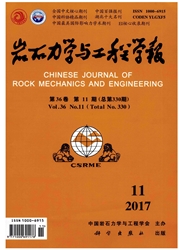

 中文摘要:
中文摘要:
为探索地球物理场中原地煤层气运移能力对煤层气储集和富集能力的影响,以地应力场、地温场中煤层气连续性方程、气体状态方程、吸附方程、渗流方程为基础,建立了应力、温度影响下的煤层气渗流控制方程。方程体现了地应力和地温对煤层气压力、含量、渗透率和孔隙率的影响,其中,应力和温度通过影响煤层气压力影响吸附量,通过影响煤层气压力和孔隙率影响游离量;温度还通过影响吸附常数b影响吸附量;不同的应力、温度组合条件下,渗透率的变化机制不同。通过Kaiser声发射原岩应力测试实验、不同温度下煤的甲烷等温吸附实验、不同温度及有效应力下煤体中甲烷渗流实验以及煤的孔隙率、工业分析等实验,研究应力、温度影响下的煤层气渗流特征。不同温度下煤的甲烷等温吸附实验表明,吸附常数a随温度变化不明显,b随温度升高而下降;不同温度、不同有效应力条件下煤的甲烷渗流实验表明,小有效应力条件下,煤体中甲烷渗透率随温度升高而升高;大有效应力条件下,渗透率随温度升高而下降。以实验数据和原始地质资料为基础,采用有限差分法,进行了地球物理场中原地煤层气渗流运移能力的一维、二维数值模拟。计算表明:研究区现今原地煤层气渗流运移导致的煤层气散失甚微,低渗煤层具有良好的储集和富集能力,但不利于后期开采,卸除地应力和升高温度是提高煤层气抽采率的有效途径。
 英文摘要:
英文摘要:
To research reservoir and enrichment capacity influenced by seepage capability of original coalbed methane under ground in geophysical field, gas seepage equations under the influence of stress-temperature are deduced based on gas equations of continuity, PVT, adsorption, and seepage. The equations reflect the influences of geostress and ground temperature on pressure, content, permeability of coalbed methane. The stress and temperature affect gas pressure and change gas adsorption content, meanwhile, they affect gas pressure and coal porosity and change gas free content. In addition, the temperature affects adsorption parameter b and changes adsorption content. Under different combinations of the stress and temperature, there are different changing mechanisms of permeability. Initial rock stress based on Kaiser method, methane adsorption at different temperatures and seepage flow at different stresses and temperatures are tested. Meanwhile, porosity, ash, water and fugitive constituent of coal samples are measured. Adsorption experiment indicates that the adsorption parameter a does not obviously change with the temperature, and b decreases with the temperature increasing. Gas permeability in coal changes in contrary modes under different temperatures and stresses, namely, it increases with the temperature increasing at low effective stress, but reduces at high effective stress. Based on laboratory experiment and geological data, one- and two-dimensional numerical solutions of gas seepage equation in geophysical field are provided in finite difference method. The results indicate that the loss amount of coalbed methane is very little because of the present seepage flow in the study area. Low permeability coal seam has advantage of reservation and enrichment, but goes against late exploitation. Pressure releasing and temperature rising are effective ways of improving drainage efficiency.
 同期刊论文项目
同期刊论文项目
 同项目期刊论文
同项目期刊论文
 Numerical simulation for protection scope of upper protective seam in steeply inclined multi-coal se
Numerical simulation for protection scope of upper protective seam in steeply inclined multi-coal se Mathematical Model of Coalbed Gas Flow with Klinkenberg Effects in Multi-Physical Fields and its Ana
Mathematical Model of Coalbed Gas Flow with Klinkenberg Effects in Multi-Physical Fields and its Ana The monitoring technology of geological hazards in the three gorges reservoir area and its prospects
The monitoring technology of geological hazards in the three gorges reservoir area and its prospects Micromechanical damage model for rocks and concretes subjected to coupled tensile and shear stresses
Micromechanical damage model for rocks and concretes subjected to coupled tensile and shear stresses 期刊信息
期刊信息
